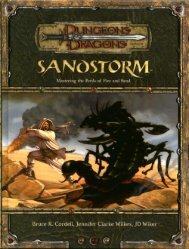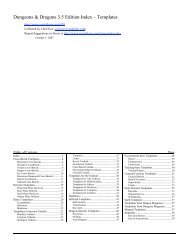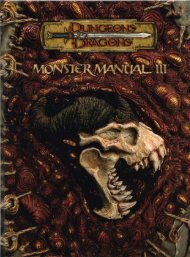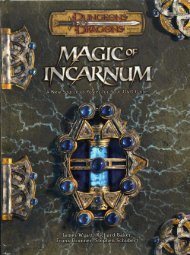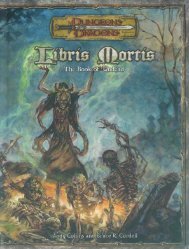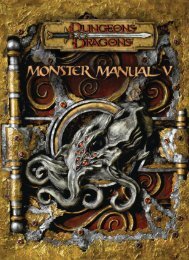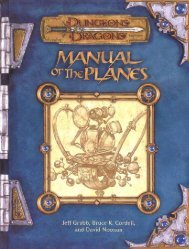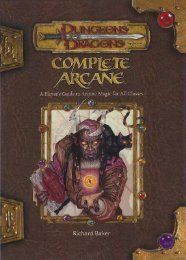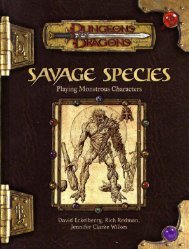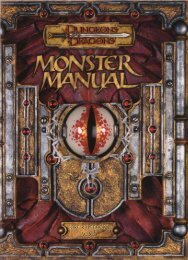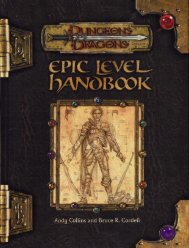CHAPTER 1ELVES10they do in other humanoid communities because elves aregenerally mindful <strong>of</strong> the rights and boundaries <strong>of</strong> others andtry to get along with everyone. Thus, though laws do exist,they are more lightly enforced than they are even in humansettlements because every situation is considered unique.Anyone who is not happy with the resolution <strong>of</strong> a dispute inan elf community is free to leave. No stigma is attached tothose who do so, though an elf who enters a new communityis <strong>of</strong>ten treated with a certain reserve for a few decades, untilhis neighbors get to know him well.The highest virtues for an elf are the ability to take care<strong>of</strong> himself, skill with magic and art, and a high degree <strong>of</strong>personal creativity. Members <strong>of</strong> less “civilized” (that is, morestaid) races are looked upon with smug amusement by elves.Similarly, an elf who is considered frivolous by other racesmay be revered as a creative genius by his own people.While most elves value freedom <strong>of</strong> expression and creativity,others find a degree <strong>of</strong> comfort in a less chaotic lifestyle.In particular, elves who wish to devote their entire lives to thepursuit <strong>of</strong> a single art may seek out human communities inwhich they can purchase the products <strong>of</strong> others’ skills ratherthan devoting even a short time to becoming completely selfsufficient.Such elves usually retain their generally pleasantattitude, but many are so focused on their own art that theyneglect the social interactions so necessary to a specializedcommunity. Even so, elves tend to fit more easily into nonelfcommunities than other races do. In particular, bridgingthe worlds <strong>of</strong> elf and human is not terribly difficult, thoughfitting into a highly ordered community <strong>of</strong> dwarves is a trialfor almost any elf.Elves tend to be quite tolerant <strong>of</strong> other races, even thosethat live very structured lives. This attitude stems from theelves’ strong belief in personal choice. If a person or even awhole group <strong>of</strong> people wish to become interdependent, theyare free to do so, as long as they do not encroach on the rights<strong>of</strong> others to do otherwise. Regardless <strong>of</strong> his opinion <strong>of</strong> thepeople he meets, a well-brought-up elf considers the habitsand outlooks <strong>of</strong> his companions to be none <strong>of</strong> his business.An old elven platitude states, “Only those who are allowedto make their own mistakes can ever truly succeed.”Roleplaying Application: Many elves take up adventuringfor a portion <strong>of</strong> their lives as young adults, both to see theworld and to gain new experiences. Elves who adventure for awhile are almost always welcomed back into their communitieswhen they decide to take a break or even retire from theadventuring life.Though elves tend to be self-absorbed and may occasionallyappear haughty, they are generally pleasant traveling companions.Many, however, are unused to working with others ingroups at first and must come to realize that although othershave their areas <strong>of</strong> specialty, they can support one another inways that jacks-<strong>of</strong>-all-trades cannot.Though all elves are fiercely independent, other aspects <strong>of</strong>an individual character require some definition. What is yourcharacter’s personality? What sort <strong>of</strong> place is he from, andhow do his friends and family back home view him? Doeshe feel the need to be completely self-sufficient, or would herather work with others to support one another’s strengths?To what extent does he value personal freedom over the needs<strong>of</strong> the group?ELVEN LIFEThe life <strong>of</strong> an elf may seem idyllic and tranquil to outsiders,and indeed many elves enjoy long periods <strong>of</strong> carefree bliss.Still, like all mortals, they aspire to greatness, endure conflictsand strife, and mark the passage <strong>of</strong> time with rituals befittingtheir culture.Elven culture is among the richest <strong>of</strong> any humanoid race.Their long life span allows elves to pursue their interests forlonger than humans can and to perfect the skills they haveacquired. The result is a complex culture rich in art, knowledge,and all the traits found in the highest <strong>of</strong> civilizations.ARTS AND CRAFTSUnlike dwarves, elves value art for its own sake. An object <strong>of</strong>art need not be anything but beautiful to be prized in an elfcommunity. The elves also find joy in turning mundane objectsinto things <strong>of</strong> beauty. Strictly utilitarian objects are fine in anemergency, but why not make them beautiful as well? To createa functional object with no beauty is considered unforgivablylazy and wasteful <strong>of</strong> both time and resources.The visual arts are highly valued in elf society, andexamples abound in every household. Painting, sculpture,textiles, fashion design, metalwork, weaponsmithing, armorsmithing,jewelry making, pottery, and all manner <strong>of</strong> craftsare considered forms <strong>of</strong> self-expression with which everyelf should be pr<strong>of</strong>icient. Translating one’s feelings into anenduring object <strong>of</strong> beauty is considered a high achievementin elven culture.Architecture is among the most valued <strong>of</strong> the elven arts,and designing structures <strong>of</strong> grace and style is a dream towhich many young elves aspire. In most cases, the loveliestelven “buildings” are those that fit seamlessly into the naturalenvironment: houses built into tree branches, crystal-carvedcaverns, and flower-festooned arbors in the wilderness.Ornamentation on such buildings is generally simple yetelegant, and done in a manner that enhances rather thanoverwhelms the basic lines <strong>of</strong> the structure.Music is also a well-loved form <strong>of</strong> artistic expression, andelf bards have refined their art to a high level. Elven musiccan be lilting and cheerful, sorrowful and deep, or any stylein between. Elves make more use <strong>of</strong> flutes, lutes, harps, andexotic stringed instruments than most other cultures, and lessuse <strong>of</strong> loud horns and percussion instruments. Their choices<strong>of</strong> instruments and composition styles combine to producethe delicate melodies for which they are justly famous.Drama is also a recognized and appreciated art form in elfcommunities, and most settlements hold plays throughoutthe year. Many elves enjoy acting and become quite pr<strong>of</strong>icientat it, and this skill stands them in good stead when they mustconduct delicate negotiations with other races.
The elves have raised one form <strong>of</strong> expression, the writtenword, to a higher level than most other races. A few otherraces have oral traditions almost as rich as those <strong>of</strong> theelves, but Corellon’s folk have made a true art <strong>of</strong> writing.Their flowing script and lyrical language frame poetry andprose <strong>of</strong> inestimable beauty, filled with a depth <strong>of</strong> emotionrarely seen in shorter-lived races. The elves live long and seemuch, but rather than hardening them, their experiencesserve to enrich their souls. Only through writing does theirdepth <strong>of</strong> feeling becometruly obvious; they tendto take care what theysay aloud, particularlyamong outsiders.Most elves keeppersonal journalsin which they recordtheir daily orweekly activities.Writing in a journalis an almost ritualisticactivity—atime for reflectionduring which anelf tries to findmeaning in theevents <strong>of</strong> theday and couchthem in justthe right wordsto convey theinformation asif the reader hadbeen present. Verseis sometimes used injournals, but lyricalprose is preferredby many. Journals <strong>of</strong>elves who have died are<strong>of</strong>ten passed down toother family members as prized heirlooms, and living elves<strong>of</strong>ten trade journals to keep up with one another’s lives orto gain insight into techniques for crafting items they havenot previously made.Nearly every form <strong>of</strong> art and craft is represented in elfcommunities. Spontaneous gatherings <strong>of</strong> musicians or artistsare common, and a few <strong>of</strong> these occasions have evolvedinto annual events. Visitors saunter through the area inwhich the artists have gathered and comment, visit, andgenerally appreciate the art being shown or performed.Some gatherings require that the art objects be created onthe spot, by either individual artists or groups. Sculptors,painters, and architects <strong>of</strong>ten take part in such events, as docrafters <strong>of</strong> various kinds. The items so created are usuallydonated to the community at large or presented as gifts t<strong>of</strong>amily, friends, or nobles. The only prizes given at elvenart gatherings are acclamation and special ribbons made <strong>of</strong>twined willow branches, but the un<strong>of</strong>ficial benefits <strong>of</strong> winningsuch prizes are immense. The elf whose work has beenrecognized in this way is welcomed in all elf communitiesthroughout the region.TECHNOLOGY AND MAGICThough many outsiders assume that elves have little or notechnology, the opposite is true. The elves’ traditional lovefor learning, art, and magic has led them to delve deeply intomany crafts, especially those that result in the creation<strong>of</strong> necessary objects that are strong, durable, andbeautiful. Because arms,armor, fortification,and stonework are alltoo <strong>of</strong>ten necessaryfor the safety <strong>of</strong> thecommunity, elveshave long studiedthe arts <strong>of</strong> metallurgy,engineering,and military architecturewiththe intent <strong>of</strong> producingworkthat demonstratesboth thecreator’s skill andhis eye for beauty.The elves’ penchantfor learning todo for themselvesensures that thesetechniques are widespreadamong thepopulation and that atleast a few masters <strong>of</strong>each kind <strong>of</strong> craft exist.Elven architectureis a thing <strong>of</strong> beautyElves prefer magic to machineryand would rather develop aspell or alchemical substancethan a mechanical device to perform a particular function.Magically powered constructs, such as golems, are rare butnot unknown among elves. The elves see little purpose intime- or labor-saving devices because they have plenty <strong>of</strong> timeto achieve their goals. However, they do appreciate devicesthat can protect loved ones and possessions when they areaway for long periods.Adoption <strong>of</strong> new magical or technological advances <strong>of</strong>tenhappens quickly among elves, who are fascinated with newdevelopments and eager to try them. However, lasting additionsto the elven arsenal are rare because the elves are justas eager to try out the next device or spell and abandon theold if it proves less effective.Magic is as necessary to most elves as breathing. Eventhose who do not become wizards, sorcerers, or bards usuallyIllus. by S. WoodCHAPTER 1ELVES11
- Page 2: C R E D I T SD E S I G NSKIP WILLIA
- Page 7 and 8: no elf could predict which memory w
- Page 9: premium. Thus, each individual can
- Page 13 and 14: do spend time away from one another
- Page 15 and 16: espects during this time, and those
- Page 17 and 18: Stores Master: Charged with keeping
- Page 19 and 20: would be the birthright of any full
- Page 21 and 22: of feet above the forest floor. Mos
- Page 23 and 24: Cleric Training: More than any othe
- Page 25 and 26: ELF HISTORYAND FOLKLOREThe elves cl
- Page 27 and 28: along with her son Hionyron, who wa
- Page 29 and 30: and return her to her people.” In
- Page 31 and 32: Table 1-3: Suffixesd% Suffix Meanin
- Page 34: CHAPTER 1ELVES34tri-level tree home
- Page 37 and 38: Illus. by C. Lukacsurious and activ
- Page 39 and 40: the reason for the farmer’s hospi
- Page 41 and 42: Halflings make a visitor feel welco
- Page 43 and 44: Halflings are usually pleasant trav
- Page 45 and 46: Halflings are as eager to experienc
- Page 47: A chief or elder heads each clan, c
- Page 50 and 51: CHAPTER 2HALFLINGS50away from their
- Page 52 and 53: CHAPTER 2HALFLINGS52Illus. by S. Wo
- Page 54 and 55: CHAPTER 2HALFLINGS54to tell how lon
- Page 56 and 57: CHAPTER 2HALFLINGS56the underbrush
- Page 58 and 59: CHAPTER 2HALFLINGSIllus. by T. Baxa
- Page 60 and 61:
CHAPTER 2HALFLINGS60Donta muden sit
- Page 63 and 64:
and one or more bedrooms. All have
- Page 65 and 66:
Illus. by C. Lukacshe cliff-dwellin
- Page 67 and 68:
Personality: Raptorans have a reput
- Page 69 and 70:
PSYCHOLOGYSome outsiders who have h
- Page 71 and 72:
for making a point through a logica
- Page 73 and 74:
flock for debate, sometimes invitin
- Page 75 and 76:
its eggs. At such times, they toler
- Page 77 and 78:
THE RAPTORAN PANTHEONThe typical ra
- Page 79 and 80:
Prayers: Prayers to the Stormfather
- Page 81 and 82:
“Welcome, friend,” said a human
- Page 83 and 84:
year since, and they share the care
- Page 85 and 86:
D: Domain spell. Domains: Protectio
- Page 87 and 88:
characteristics are summarized in t
- Page 90 and 91:
CHAPTER 3RAPTORANS90Authority Figur
- Page 92 and 93:
CHAPTER 4OTHERRACES92a humanlike ra
- Page 94 and 95:
CHAPTER 4OTHERRACES94ment, finding
- Page 96 and 97:
CHAPTER 4OTHERRACES96Illus. by S. B
- Page 98 and 99:
Table 4-1: The CentaurHit Base Atta
- Page 100 and 101:
CHAPTER 4OTHERRACES100nomadic gnoll
- Page 102 and 103:
Table 4-2: The GnollBase Fort Ref W
- Page 104 and 105:
CHAPTER 4OTHERRACES104of the humano
- Page 106 and 107:
CHAPTER 4OTHERRACESsneak attack, bu
- Page 108 and 109:
CHAPTER 5PRESTIGECLASSES108Shadowda
- Page 110 and 111:
CHAPTER 5PRESTIGECLASSESIllus. by W
- Page 112 and 113:
CHAPTER 5PRESTIGECLASSES112the foll
- Page 114 and 115:
CHAPTER 5PRESTIGECLASSES114Entry Re
- Page 116 and 117:
CHAPTER 5PRESTIGECLASSESIllus. by J
- Page 118 and 119:
CHAPTER 5PRESTIGECLASSESLUCKSTEALER
- Page 120 and 121:
CHAPTER 5PRESTIGECLASSESIllus. by J
- Page 122 and 123:
CHAPTER 5PRESTIGECLASSESEL 11: Kuly
- Page 124 and 125:
CHAPTER 5PRESTIGECLASSES124spellcas
- Page 126 and 127:
CHAPTER 5PRESTIGECLASSES126save bon
- Page 128 and 129:
CHAPTER 5PRESTIGECLASSESmore than o
- Page 130 and 131:
CHAPTER 5PRESTIGECLASSES130raptoran
- Page 132 and 133:
CHAPTER 5PRESTIGECLASSES132Table 5-
- Page 134 and 135:
CHAPTER 5PRESTIGECLASSESfriendly—
- Page 136 and 137:
CHAPTER 5PRESTIGECLASSESYou no long
- Page 138 and 139:
CHAPTER 5PRESTIGECLASSES138small fe
- Page 140 and 141:
CHAPTER 5PRESTIGECLASSES140ranger.
- Page 142 and 143:
CHAPTER 5PRESTIGECLASSESIllus. by T
- Page 144 and 145:
CHAPTER 5PRESTIGECLASSESEncountersP
- Page 146 and 147:
CHAPTER 6CHARACTEROPTIONS146Conditi
- Page 148 and 149:
CHAPTER 6CHARACTEROPTIONS148If the
- Page 150 and 151:
CHAPTER 6CHARACTEROPTIONSIllus. by
- Page 152 and 153:
CHAPTER 6CHARACTEROPTIONSIllus. by
- Page 154 and 155:
CHAPTER 6CHARACTEROPTIONSIllus. by
- Page 156 and 157:
Table 6-3: Elf Ranger Racial Substi
- Page 158 and 159:
Table 6-5: Halfling Druid Racial Su
- Page 160 and 161:
CHAPTER 6CHARACTEROPTIONS160Table 6
- Page 162 and 163:
Class SkillsRaptoran fighter substi
- Page 164 and 165:
CHAPTER 7EQUIPMENTAND MAGICIllus. b
- Page 166 and 167:
CHAPTER 7EQUIPMENTAND MAGIC166anoth
- Page 168 and 169:
CHAPTER 7EQUIPMENTAND MAGICTable 7-
- Page 170 and 171:
CHAPTER 7EQUIPMENTAND MAGICIllus. b
- Page 172 and 173:
CHAPTER 7EQUIPMENTAND MAGICIllus. b
- Page 174 and 175:
2nd-Level Ranger SpellWoodland Veil
- Page 176 and 177:
WOODLAND VEILIllusion (Glamer)Level
- Page 178 and 179:
CHAPTER 8CAMPAIGNS INTHE WILD178THE
- Page 180 and 181:
CHAPTER 8CAMPAIGNS INTHE WILDIllus.
- Page 182 and 183:
CHAPTER 8CAMPAIGNS INTHE WILD182(lo
- Page 184 and 185:
CHAPTER 8CAMPAIGNS INTHE WILD184Ski
- Page 186 and 187:
CHAPTER 8CAMPAIGNS INTHE WILD186Tab
- Page 188 and 189:
CHAPTER 8CAMPAIGNS INTHE WILDIllus.
- Page 190 and 191:
CHAPTER 8CAMPAIGNS INTHE WILDIllus.
- Page 192:
APPENDIX19261 Guards are needed to
- Page 195 and 196:
2THE CLIFFThe Rifinti dwelling lies
- Page 198 and 199:
supplies for craftwork. Lamps fuele
- Page 200 and 201:
Nae’fidrim: Female owl companion;
- Page 202 and 203:
Creatures: A cleric is always on du
- Page 204 and 205:
cloak of elvenkind, oil of magic we
- Page 206:
aptoran contraries. If visitors can



